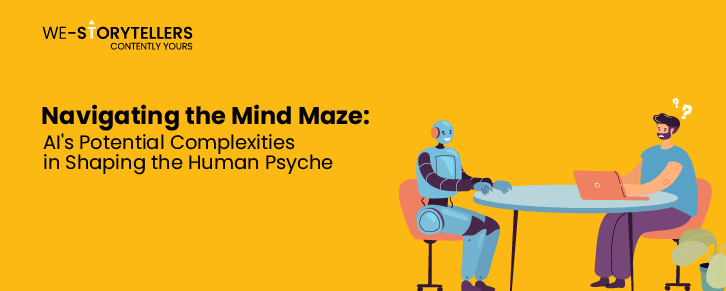AI is now an integral part of our work and personal lives, making things easier with virtual assistants and smart devices that cater to our individual preferences. But the fundamental question – Is AI making our lives meaningful or are we getting caught in a web of dependency and vulnerability, possibly feeling isolated and emotionless, begs an answer.
As AI integrates into our existence, there’s a risk of interpersonal connections being replaced by Artificial Intelligence leading to isolation and emotional detachment. This raises a pressing concern on whether AI is truly enriching the quality of our lives by fostering genuine connections and preserving emotional well-being or contributing to a feeling of isolation and emotional numbness.
That said, let’s delve into the potential complexities that can impact the human psyche, given its increased integration into our daily lives.
Understanding the Human Psyche
As social beings, humans thrive on emotions, empathy and connection. Emotions shape our thoughts, interactions, and decisions.
While AI can assist in recognizing and analyzing emotions, the true understanding and interpretation of emotions remain quintessentially human. The convenience and efficiency that AI brings to our lives are undeniable. But as technology becomes an integral part of our lives, there’s a worry that it might lead to isolation, draining our emotions that make life vibrant and meaningful.
Take the example of a scenario where a group of individuals are working remotely. Each immersed in their own world with minimal real-life interaction. In this virtual workspace, AI-driven project management tools assign tasks, automate communication, and monitor progress. While the efficiency of AI streamlines workflows, the absence of physical presence and face-to-face interactions creates a sense of isolation. Despite the seamless coordination facilitated by AI, the human touch is noticeably absent. The team experiences a lack of social connection and a weakened sense of community.
Relying on AI systems extensively could have adverse consequences that can affect individuals psychologically.
The Interplay of AI and the Human Psyche
The impact of AI extends to complex emotional and social dimensions, with consequences such as diminished empathy, heightened levels of depression and emotional detachment.
Consider AI-driven virtual assistants or chatbots, while they provide efficient solutions, they lack the emotional depth and empathy inherent in human communication. For instance, a person seeking support or advice may interact with a chatbot that responds based on predefined algorithms, missing the nuanced emotional cues and genuine empathy a human conversation would offer. This kind of interaction contributes to emotional disconnection resulting in depression.
Furthermore, as individuals rely on AI algorithms to curate information and make recommendations, there’s a risk of passively accepting suggestions. They do not engage in the cognitive processes necessary for independent, critical thought.
AI constantly shows individuals the information that fits their existing beliefs and preferences. This happens because algorithms watch what individuals do online—like what articles they read or videos they watch. AI uses this data to personalize the content they see, giving them more of what they already agree with. Over time, this creates a “filter bubble,” where individuals mainly see information that matches their own views. This limits their understanding of different perspectives and makes them socially isolated.
There’s no denying the fact that AI is being used in almost all domains today – from modelling weather patterns to controlling driverless vehicles to helping with medical diagnoses. A major challenge is when we let AI systems take the critical step up from the role of adviser to that of executive manager.
Cultivating Genuine Human Connections
To achieve a harmonious balance in the face of AI’s overwhelming presence, cultivating meaningful connections, and prioritizing open communication is extremely crucial.
The future of work and society is not a zero-sum game between humans and AI, but a collaborative partnership that leverages the best of both worlds. At We-Storytellers, our belief is that human connections bring meaning, value, contribution, and joy. We focus on building and removing barriers to human connection so that people, teams, and organizations can thrive together.
Want to know how? Let’s talk!


